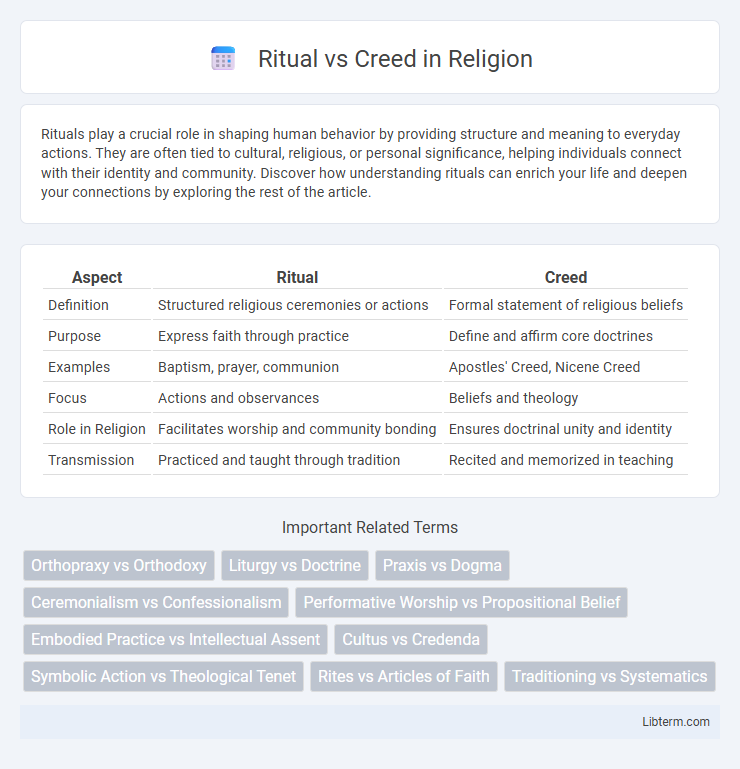Rituals play a crucial role in shaping human behavior by providing structure and meaning to everyday actions. They are often tied to cultural, religious, or personal significance, helping individuals connect with their identity and community. Discover how understanding rituals can enrich your life and deepen your connections by exploring the rest of the article.
Table of Comparison
| Aspect | Ritual | Creed |
|---|---|---|
| Definition | Structured religious ceremonies or actions | Formal statement of religious beliefs |
| Purpose | Express faith through practice | Define and affirm core doctrines |
| Examples | Baptism, prayer, communion | Apostles' Creed, Nicene Creed |
| Focus | Actions and observances | Beliefs and theology |
| Role in Religion | Facilitates worship and community bonding | Ensures doctrinal unity and identity |
| Transmission | Practiced and taught through tradition | Recited and memorized in teaching |
Defining Ritual and Creed
Ritual refers to a set of established actions or ceremonies performed in a specific sequence, often symbolizing beliefs or values within a culture or religion. Creed is a formal statement of beliefs or principles that guides an individual's or group's worldview and ethical stance. Understanding the distinction between ritual as physical practice and creed as ideological foundation clarifies their complementary roles in shaping identity and community cohesion.
Historical Origins of Rituals and Creeds
Rituals originated from ancient human practices aimed at connecting with the divine through symbolic actions rooted in tribal and religious traditions. Creeds emerged later as formalized statements of faith designed to unify belief systems and establish doctrinal orthodoxy within religious communities. Historical records trace rituals back to prehistoric times, while creeds developed primarily during early Christian councils such as Nicaea in 325 CE.
Key Differences Between Rituals and Creeds
Rituals consist of prescribed actions or ceremonies repeated within cultural or religious practices, emphasizing physical expression and community participation. Creeds are formal statements of belief or doctrine that articulate the core values and theological principles of a faith or ideology. The key difference lies in rituals being performative and experiential, while creeds serve as cognitive frameworks guiding belief systems.
The Role of Ritual in Religious Practice
Rituals serve as essential expressions of religious beliefs, reinforcing the community's shared values and sacred narratives through symbolic actions and ceremonies. They provide a structured framework for worship, enabling practitioners to experience a tangible connection to the divine and affirm their devotion. These repeated, meaningful practices embody theological principles and foster spiritual discipline within religious traditions.
The Function of Creed in Belief Systems
The function of creed in belief systems is to provide a structured set of core doctrines that define and unify a community's faith, offering clarity and consistency in theological interpretation. Creeds serve as authoritative statements that codify essential beliefs, facilitating communal identity and doctrinal continuity across generations. This codification helps believers internalize values, fosters collective commitment, and guides ethical behavior within the religious framework.
Ritual as a Medium for Community and Identity
Ritual functions as a powerful medium for community and identity by fostering shared experiences that reinforce collective bonds and cultural continuity. Through repetitive actions and symbolic gestures, rituals create a tangible sense of belonging and social cohesion among participants. This embodied participation strengthens individual identity by aligning personal beliefs with communal values and traditions.
Creed as a Foundation for Doctrine and Faith
Creed serves as the foundational framework for doctrine and faith, encapsulating core beliefs that guide religious understanding and practice. Unlike ritual, which emphasizes external expressions and ceremonies, creed provides a structured taxonomy of theological truths essential for communal identity and spiritual coherence. This systematic articulation of faith principles ensures continuity, doctrinal clarity, and unified belief within religious traditions.
Psychological Impact of Rituals vs. Creeds
Rituals deeply engage the brain's reward system, fostering a sense of belonging and emotional stability through repetitive, symbolic actions that reduce anxiety and enhance group cohesion. Creeds provide cognitive frameworks that influence belief structures and moral judgments, shaping identity by solidifying values and guiding decision-making processes. Together, rituals and creeds synergize to strengthen psychological resilience, with rituals activating experiential emotions and creeds reinforcing intellectual commitment.
Contemporary Perspectives on Ritual and Creed
Contemporary perspectives on ritual and creed emphasize their complementary roles in shaping religious identity and communal cohesion, with rituals providing embodied experiences that reinforce the abstract principles outlined in creeds. Scholars highlight how rituals adapt to modern contexts, serving as dynamic practices that sustain belief systems beyond verbal declarations. This interplay between ritual actions and doctrinal statements fosters deeper engagement in diverse faith traditions and informs evolving expressions of spirituality.
Integrating Ritual and Creed in Modern Spirituality
Integrating ritual and creed in modern spirituality enhances personal meaning by combining symbolic actions with core beliefs, fostering a holistic spiritual experience. Rituals serve as tangible expressions that reinforce creeds, embedding values into daily practice and community life. This fusion supports contemporary seekers in grounding abstract doctrines through embodied practices, promoting deeper connection and spiritual growth.
Ritual Infographic

 libterm.com
libterm.com